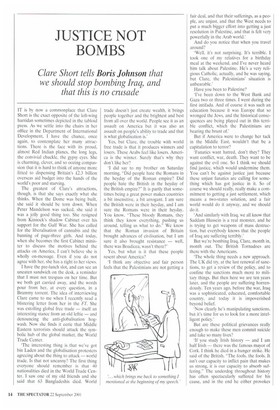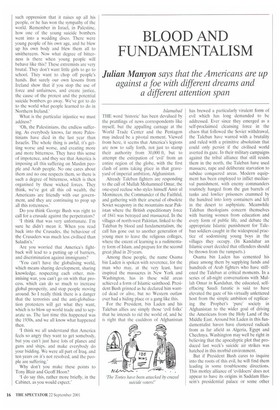JUSTICE NOT BOMBS
Clare Short tells Boris Johnson that we should stop bombing Iraq, and that this is no crusade
IT is by now a commonplace that Clare Short is the exact opposite of the left-wing harridan sometimes depicted in the tabloid press. As we settle into the chairs in her office in the Department of International Development, I have the chance, once again, to contemplate her many attractions. There is the face with its proud, almost Red Indian planes, the long legs, the convivial chuckle, the gypsy eyes. She is charming, clever, and so oozing compassion that it is hard to think of anyone more fitted to dispensing Britain's 12.3 billion overseas aid budget into the hands of the world's poor and starving.
The greatest of Clare's attractions, though, is that she says exactly what she thinks. When the Dome was being built, she said it should be torn down. When Peter Mandelson was sacked, she said it was a jolly good thing too. She resigned from Kinnock's shadow Cabinet over his support for the Gulf War. She has called for the liberalisation of cannabis and the banning of page-three girls. And today, when she becomes the first Cabinet minister to discuss the motives behind the attacks on America, I can't believe she is wholly on-message. Even if you do not agree with her, she has a right to her views.
I have the pre-lunch slot, and can see an uneaten sandwich on the desk, a reminder that I must not trespass on her time. But we both get carried away, and the words pour from her, at every question, in a Brummy torrent. The idea of interviewing Clare came to me when I recently read a blistering letter from her in the FT. She was extolling global free trade — itself an interesting stance from an old leftie — and denouncing the anti-globalisation hogwash. Now she finds it eerie that Middle Eastern terrorists should attack the symbolic hub of the global market, the World Trade Center.
'The interesting thing is that we've got bin Laden and the globalisation protesters agreeing about the thing to attack — world trade. Is that not uncanny? The first thing everyone should remember is that 40 nationalities died in the World Trade Center. I saw one of my old friends and she said that 63 Bangladeshis died. World trade doesn't just create wealth, it brings people together and the brightest and best from all over the world. People see it as an assault on America but it was also an assault on people's ability to trade and that is what globalisation is.'
Yes, but Clare, the trouble with world free trade is that it produces winners and losers. These Arabs feel like losers. America is the winner. Surely that's why they don't like her?
'I did say to my brother on Saturday morning, "Did people hate the Romans in the heyday of the Roman empire? Did people hate the British in the heyday of the British empire?" It is partly that sometimes being a great power makes countries a bit insensitive, a bit arrogant. I am sure the British were in their heyday, and I am sure the Romans were in their heyday. You know, "These bloody Romans, they think they know everything, pushing us around, telling us what to do." We know that the Roman invasion of Britain brought advances of civilisation, but I am sure it also brought resistance — well, there was Boadicea, wasn't there?'
Yes, but what is it that these people resent about America?
'I think any objective and fair person feels that the Palestinians are not getting a fair deal, and that their sufferings, as a people, are unjust, and that the West needs to put a much bigger effort into getting a just resolution in Palestine, and that is felt very powerfully in the Arab world.'
And do you notice that when you travel around?
'Well, it's not surprising. It's terrible. I took one of my relatives for a birthday meal at the weekend, and I've never heard him talk about Palestine. He's a very religious Catholic, actually, and he was saying, but Clare, the Palestinians' situation is unbearable.'
Have you been to Palestine?
'I've been down to the West Bank and Gaza two or three times. I went during the first intifada. And of course it was such an education because it was Europe that so wronged the Jews, and the historical consequences are being played out in this terrible conflict, which the Palestinians are bearing the brunt of.'
But if America were to change her tack in the Middle East, wouldn't that be a capitulation to terror?
'Fanatics want hatred, don't they? They want conflict, war, death. They want to be against the evil one. So I think we should find justice, which would undermine them. You can't be against justice just because these unjust fanatics are calling for something which has got justice in it. So of course we should really, really make a commitment to getting a just settlement, which means a two-states solution, and a fair world would do it anyway, and we should do it.
'And similarly with Iraq, we all know that Saddam Hussein is a real monster, and he is trying to get weapons of mass destruction, but everybody knows that the people of Iraq are suffering terribly.'
But we're bombing Iraq, Clare, month in, month out. The British Tornadoes are there with the Americans.
'The whole thing needs a new approach. The UK did try, at the last renewal of sanctions, to get a review of the policy, and to confine the sanctions much more to military things. But then here we are ten years later, and the people are suffering horrendously. Ten years ago, before the war, Iraq was a sophisticated, educated, comfortable country, and today it is impoverished beyond belief.
'Now clearly he's manipulating sanctions, but it's time for us to look for a more intelligent policy.'
But are these political grievances really enough to make these men commit suicide and take so many lives?
'If you study Irish history — and I am half Irish — there was the famous mayor of Cork. I think he died in a hunger strike. He said of the British, "The fools, the fools. It isn't our capacity to inflict pain that makes us strong, it is our capacity to absorb suffering." The underdog throughout history has often spectacularly suffered for his cause, and in the end he either provokes such oppression that it raises up all his people, or he has won the sympathy of the world. Remember in Israel, in Palestine, how one of the young suicide bombers went into a wedding disco. There were young people of his own age, and he blew up his own body and blew them all to smithereens. Now what degree of bitterness is there when young people will behave like this? These extremists are very brutal. They don't want little girls to go to school. They want to chop off people's hands. But surely our own lessons from Ireland show that if you stop the use of force and unfairness, and create justice, the cause of the protest and the potential suicide bombers go away. We've got to do to the world what people learned to do in Northern Ireland.'
What is the particular injustice we must address?
'Oh, the Palestinians, the endless suffering. As everybody knows, far more Palestinians have died in the last year than Israelis. The whole thing is awful, it's getting worse and worse, and creating more and more bitterness. They have this sense of impotence, and they see that America is imposing all this suffering on Muslim people and Arab people. No one cares about them and no one respects them, so there is such a degree of bitterness, which is then organised by these wicked forces. They think, we've got all this oil wealth. the Americans are friendly with our government, and they are continuing to prop up all this rottenness.'
Do you think George Bush was right to call for a crusade against the perpetrators?
'I think that was very unfortunate. I'm sure he didn't mean it. When you read back into the Crusades, the behaviour of the Crusaders was much less civilised than Saladin's.'
Are you worried that America's fighthack will lead to a putting up of barriers, and discrimination against immigrants?
'You can't have the globalising world, which means sharing development, sharing knowledge, respecting each other, minimising war, you can't go on with that process, which can do so much to increase global prosperity, and stop people moving around. So I really think there is a danger that the terrorists and the anti-globalisation protesters will get what they want, which is to blow up world trade and to separate us. The last time this happened was the 1930s, and we all know what happened then.
'I think we all understand that America feels so angry they want to get somebody, but you can't just have lots of planes and guns and ships, and make everybody do your bidding. We were all part of Iraq, and ten years on ifs not resolved, and the people are suffering.'
Why don't you make these points to Tony Blair and Geoff Hoon?
'I do say this, rather more briefly, in the Cabinet, as you would expect.'











































































 Previous page
Previous page